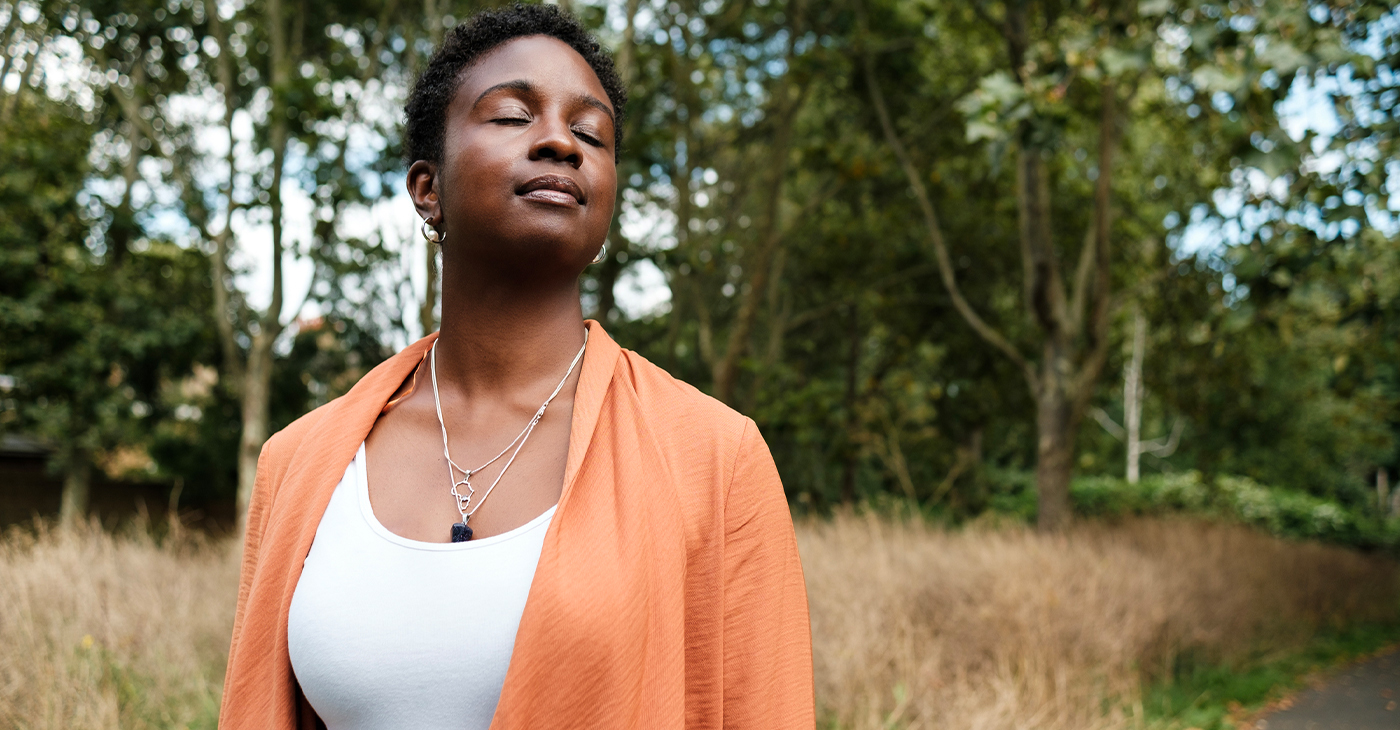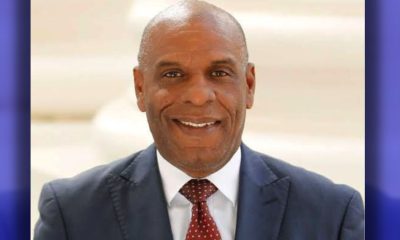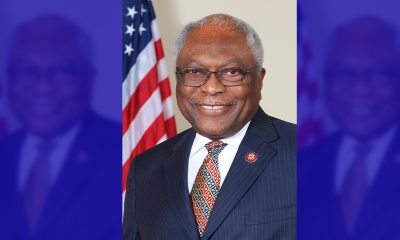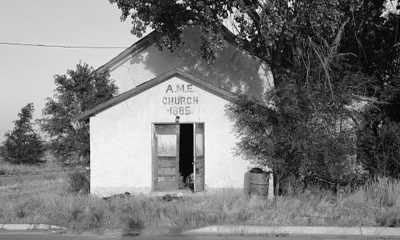Health
Mississippi, West Virginia Toughest on School Immunizations

Pediatric residents from the Batson Children’s Hospital at the University of Mississippi Medical Center wear stickers calling for the lawmakers to support immunizations during a visit to the Capitol, Tuesday, Feb. 10, 2015, in Jackson, Miss. According to the Centers for Disease Control and Prevention, Mississippi has the highest measles immunization rate in the country for children entering kindergarten. (AP Photo/Rogelio V. Solis)
JOHN RABY, Associated Press
EMILY WAGSTER PETTUS, Associated Press
CHARLESTON, W.Va. (AP) — With rampant diabetes and obesity, Mississippi and West Virginia have struggled with health crises. Yet when it comes to getting children vaccinated, these states don’t mess around.
The states, among the poorest in the country, are the only ones that refuse to exempt school children from mandatory vaccinations based on their parents’ personal or religious beliefs. Separate efforts to significantly loosen those rules died in both states’ legislatures last week.
Mississippi has the highest immunization rate in the country for children entering kindergarten at 99.7 percent, while West Virginia is at roughly 96 percent, according to the Centers for Disease Control and Prevention. The figures cover vaccines for measles, mumps and rubella; diphtheria, tetanus and pertussis; and varicella, or chickenpox.
Public health officials say a 90 percent immunization rate is critical to minimizing the potential for a disease outbreak.
“Mississippi is not traditionally viewed as a leader on health issues. But in this area, they should be proud of the fact that they have not changed this law. Mississippi and West Virginia could be role models for other states,” said Dr. Mark Schleiss, a pediatrician and vaccine researcher at the University of Minnesota.
A recent measles outbreak that has sickened more than 100 people has brought attention to policies in 48 states that allow parents to opt out of vaccinating their children because of their religious beliefs or personal beliefs, or both.
But in West Virginia and Mississippi the rules are firm: Barring a significant medical reason, kids who haven’t been vaccinated can’t attend school — public or private.
Dr. Rahul Gupta, West Virginia’s state health officer, said the limit on exemptions is the reason his state has been spared from any measles outbreaks for decades. And the policy has been relatively uncontroversial.
“The overwhelming majority of the public … support having more of their children protected through vaccinations than less,” he said.
Some parents in West Virginia are perplexed that people wouldn’t vaccinate their kids.
“I don’t think it’s a big deal,” said Paula Beasley, whose daughter attends fifth grade in Cross Lanes, West Virginia. “Everyone needs to. It’s all for the greater good.”
Mississippi lawmakers are considering a proposal to let doctors grant medical exemptions that would allow children to skip or delay a vaccination. Currently, only the state Department of Health can grant an exemption. Though all 135 requested exemptions were granted for this school year, a group called Mississippi Parents for Vaccine Rights said the department has ignored its concerns that the state requires too many immunizations too early in life. The activists’ demand for a philosophical exemption was stripped from the bill last week.
Tracey Liles of Grenada, Mississippi, who has a 13-year-old daughter and a 3-year-old son, is among those pushing for the change because she thinks the health department has been too stingy in granting medical exemptions. Liles said her daughter is fully vaccinated but ran a high fever and slept for two days after a round of vaccinations about 10 years ago. Her daughter, who is now in eighth grade, had to get a state-mandated booster shot for diphtheria, tetanus and pertussis before entering seventh grade.
“Obviously, I wasn’t going to pull her out of school, being a cheerleader and everything. So, we did it,” Liles said. “Basically, I feel like I was forced to do it, but I didn’t have a choice.”
Dr. Mary Currier, the state health officer in Mississippi, has urged legislators not to weaken the immunization requirements, particularly with measles spreading in other states.
Mississippi enacted a strong vaccination law in the 1970s. In 1979, the Mississippi Supreme Court blocked a father’s request not to vaccinate his son because of religious beliefs.
The protection of students “against the horrors of crippling and death resulting from poliomyelitis or smallpox or from one of the other diseases against which means of immunization are known and have long been practiced successfully, demand that children who have not been immunized should be excluded from the school community until immunization has been accomplished,” the court wrote.
Republican Dean Kirby, chairman of the Mississippi Senate Public Health Committee, said that when proposals to create a philosophical exemption arose in recent years, he received calls mostly from one side — those wanting the change. With the measles outbreak this year, Kirby said he’s hearing from parents who want to keep the law as it is.
“They don’t want their children going to school with people who have not had the shots,” Kirby said.
West Virginia’s school vaccination law has its roots in the 1880s and has been repeatedly changed. But the trend toward expanding exemptions never gained traction.
Last week, a proposed religious exemption was removed from consideration without debate in the legislature.
Dr. Ron Stollings, a state senator, said lawmakers may tweak which state officials can grant medical exemptions, but public safety demands exemptions be kept to a minimum.
“Without this mandate, we’d be in the 60 to 70 percent vaccinate rate and not 90 percent,” he said.
___
Emily Wagster Pettus reported from Jackson, Mississippi. Associated Press writer Jonathan Mattise contributed from Charleston.
Copyright 2015 The Associated Press. All rights reserved. This material may not be published, broadcast, rewritten or redistributed.
Bay Area
Mind, Body, and Spiritual Well-Being for Women Addressed in NAACP Forum in Oakland
The Women In The NAACP Oakland Branch is proud to announce the upcoming “Total You – Mind, Body, and Spirit Women’s Health Forum” scheduled for April 27 at Acts Full Gospel Church. Running from 9 a.m.-2 p.m. at 1034 66th Ave., this forum aims to provide an empowering platform for women to engage in discussions, gain knowledge, and access resources pertaining to their health and well-being.

Special to The Post
The Women In The NAACP Oakland Branch is proud to announce the upcoming “Total You – Mind, Body, and Spirit Women’s Health Forum” scheduled for April 27 at Acts Full Gospel Church.
Running from 9 a.m.-2 p.m. at 1034 66th Ave., this forum aims to provide an empowering platform for women to engage in discussions, gain knowledge, and access resources pertaining to their health and well-being.
The forum will feature renowned experts, healthcare professionals, and advocates from Genentech, John Muir Health, Sutter Health of The East Bay, Kaiser Permanente, and the Alameda County Public Health Department.
Our expert panel will address various aspects of women’s health, including physical, mental, and emotional well-being, and healthy relationships. The forum will encompass a wide range of topics such as breast cancer, menopause, reproductive health, nutrition, mental health awareness, preventive care, and much more.
Participants will have the opportunity to attend informative sessions, interactive workshops, and panel discussions led by experts in their respective fields. Additionally, there will be wellness activities, screenings, and informational booths offering valuable resources and support.
This forum is open to women of all ages and backgrounds, encouraging inclusivity and diversity in the conversation surrounding women’s health. Whether you’re seeking information for yourself, a loved one, or simply looking to connect with other women, this event promises to be enlightening and empowering.
For more information and to register for the Total You Women’s Health Forum, please visit https://www.naacpoakland.org/ or contact Dr. Delores Thompson. WIN chairwoman at (510) 328-3638.
The Women In The NAACP Oakland Branch is dedicated to empowering women, and young teen girls. We look forward to your participation in this important event.
To register, go to https://www.naacpoakland.org/events/the-total-you-womens-health-forum
Alameda County
Oakland Conducts Its Biennial ‘Point in Time’ Homelessness Count
Oakland, along with other cities in Alameda County, conducted their biennial ‘Point In Time’ census count on Feb. 1 to gain a thorough understanding of the size and dispersion of the homeless population in the region. The Point In Time (PIT) count is federally required by the Housing and Urban Development Department as a requirement to receive funding and resources to tackle homelessness in the area.

By Magaly Muñoz
Oakland, along with other cities in Alameda County, conducted their biennial ‘Point In Time’ census count on Feb. 1 to gain a thorough understanding of the size and dispersion of the homeless population in the region.
The Point In Time (PIT) count is federally required by the Housing and Urban Development Department as a requirement to receive funding and resources to tackle homelessness in the area.
David Modersbach, Grants Manager of Alameda County Health Care for the Homeless program, said that the methodology this time around was different, as this count had a much more personal “lived experience” aspect that previous counts did not have.
In 2022, the county relied more on statistical extrapolation and assumptions, but this year’s survey questionnaires allowed for details on substance abuse issues, how long someone has been living without proper housing, what resources people are in need of and much more.
“[The PIT count is] a critical opportunity for the county, Continuum of Care, and cities to understand the magnitude of homelessness in Alameda County. [The count] enables us to better allocate resources and implement effective programs to tackle this issue head-on in a compassionate and inclusive way,” Modersbach said.
St. Mary’s Center was one of the many meeting hubs across the county that hosted volunteers and community officials the morning of the count. The organization has been deeply involved in the effort to provide resources for unhoused people and others in need.
St. Mary’s is a nonprofit in West Oakland that helps seniors and preschool families with food and housing. Last year, the organization helped about 50 seniors find housing after they had fallen on hard times.
Sharon Cornu, executive director of St. Mary’s, said a lot of the older couples and individuals that come into the center have borne the brunt of the skyrocketing cost of living in the Bay Area. The most recent influx of seniors St. Mary’s has seen coming in for help has been made up of people who were evicted when the COVID-19-related moratorium on rent payment ended.
“Seniors are the fastest growing segment of the unhoused and the incredibly high cost of housing is driving them to the streets,” Cornu said.
Among the volunteers were workers with Operation Dignity, a nonprofit organization that helps veterans and those living on the street find shelter, transitional housing and supportive services.
“These are our stomping grounds,” Ivan Magana, program manager for Operation Dignity said.
Magana stated that his team was extremely familiar with the people residing in the encampments they were conducting the count in since Operation Dignity made many visits to these areas while doing community outreach. He said they had even informed some of the unhoused people they knew about the count a few days prior so they would not be alarmed when the enumerators showed up early in the morning to conduct the count.
Not everyone got the memo though, as the volunteers encountered an almost violent situation around the 6 a.m. when a young woman living in a bus yelled at the Operation Dignity workers to leave her alone.
Luckily, the three-year experience Mangana has working with Operation Dignity and his knowledge of therapeutic health services, equipped him with the techniques needed to deescalate the tension. The woman soon realized who the volunteers were and apologized, he said.
Another volunteer and Operation Dignity worker, Yolanda Kirkpatrick, noted that she was initially hesitant because of the early schedule. She felt the time deterred others from participating, too.
Her prediction would come true as the hours went on and they continued to walk along 24th St in downtown Oakland and there was very little activity on the streets.
The volunteers shared similar sentiments. Although the community the people they were engaging for the count and surveys encounter tend to distrust outsiders, the PIT count was necessary for the city to receive the appropriate level of federal funds to address a crisis that is spiraling out of control in California.
A full analysis and report of the count will be made available in the summer.
Community
For Cervical Cancer Month, Medical Community Focused on Education
January was Cervical Cancer Awareness Month. Physicians, advocates and others in the medical community commemorated the month by raising awareness about a form of cancer they say is highly preventable and treatable. Cervical cancer is caused by a virus called the human papillomavirus (HPV) and it develops slowly over time but can be prevented with proper care in girls as young as 13 years old.

By Magaly Muñoz
January was Cervical Cancer Awareness Month.
Physicians, advocates and others in the medical community commemorated the month by raising awareness about a form of cancer they say is highly preventable and treatable.
Cervical cancer is caused by a virus called the human papillomavirus (HPV) and it develops slowly over time but can be prevented with proper care in girls as young as 13 years old.
Sonia Ordonez, an OBGYN and gynecology surgeon at Kaiser Permanente, stated that as soon as people with cervixes reach the maturity reproductive age, they should start taking preventative measures like getting the HPV vaccine. The vaccine involves a series of two-doses for people aged 9 through 14 or three-doses for people 15 through 45 years old.
“I see a lot of young women who can’t remember or may not have gotten [the vaccine] when they were younger, or maybe got one, but we can give them the series of vaccines and restart at any point in time,” Ordonez said.
She said that cervical cancer is not the only cancer caused by HPV. Strains of the virus can also lead to throat, anal and penile cancers.
Screening is also an effective way to check for cervical cancer and should be done every three years after someone turns 21, doctors recommend. It is best to start as early as possible to catch occurrences early.
Ordonez said that this cancer is also more likely found in people of color and has led to more deaths overall.
A Mayo Clinic article published last month stated that Black women are more likely to be diagnosed and die of cervical cancer, compared to White women in the U.S.
2,000 Black women are diagnosed every year with cervical cancer and 40% die as a result.
“This disparity is not due to genetic differences among White, Black or Hispanic women, but rather related to systemic racism, access to healthcare and socioeconomic factors,” Dr. Olivia Cardenas-Trowers, a Mayo Clinic urogynecologist, said in the article.
Ordonez stated that immigrant women are also highly susceptible to the cancer, as many Latin American countries may not have accessibility to screenings or lack of insurance makes it harder for them to get tested.
Hispanic women are 40% more likely to be diagnosed with cervical cancer, and 30% more likely to die from it, as compared to non-Hispanic White women, according to the Office of Minority Health.
Family medicine physician, Joy Anyanwu, stated that the pandemic contributed to hesitancy about getting cervical cancer screenings among some women. Other factors are people’s aversion to vaccines, parents not wanting to believe that their children are or will become sexually active, and doubt about the overall effectiveness of the vaccine.
“The vaccine is very safe — over 97% effective in preventing cervical cancer,” Anyanwu said. “Even if you aren’t having sex, the earlier you start would actually help.”
Anyanwu said she understands that parents might not want to ask questions about their children’s reproductive health, but it’s a mindset that can be a barrier to having important conversation about prevention or care.
To keep families their families and communties healthy, the doctor emphasized that people should prioritize keeping up with their vaccine series and going to screenings every year.
-

 Community2 weeks ago
Community2 weeks agoFinancial Assistance Bill for Descendants of Enslaved Persons to Help Them Purchase, Own, or Maintain a Home
-

 Activism4 weeks ago
Activism4 weeks agoOakland Post: Week of April 3 – 6, 2024
-

 Business2 weeks ago
Business2 weeks agoV.P. Kamala Harris: Americans With Criminal Records Will Soon Be Eligible for SBA Loans
-

 Community2 weeks ago
Community2 weeks agoAG Bonta Says Oakland School Leaders Should Comply with State Laws to Avoid ‘Disparate Harm’ When Closing or Merging Schools
-

 Activism3 weeks ago
Activism3 weeks agoOakland Post: Week of April 10 – 16, 2024
-

 Community2 weeks ago
Community2 weeks agoOakland WNBA Player to be Inducted Into Hall of Fame
-

 Community2 weeks ago
Community2 weeks agoRichmond Nonprofit Helps Ex-Felons Get Back on Their Feet
-

 Community2 weeks ago
Community2 weeks agoRPAL to Rename Technology Center for Retired Police Captain Arthur Lee Johnson























































